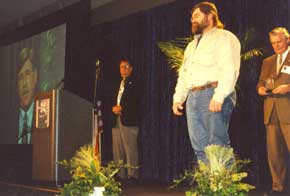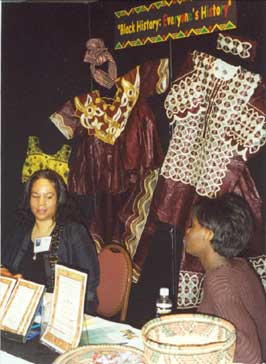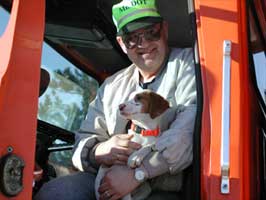 |
 |







|
 |
 |
 |
 |
 |
 |
 |
 |
 |
 | |
 |
 |
 |
|
|
 |
 |
Chris Cheney (second from right), a transportation generalist at Togo, received a Pride Award Feb. 14 for rescuing an elderly woman who had fallen and broken her leg while retrieving her mail. Behind him from left are Mike Robinson, District 1 Engineer (on videotape), Deputy Commissioner Doug Weiszhaar and Commissioner Elwyn Tinklenberg. |
The challenge for Mn/DOT in the future is understanding what we do “in the context of the tremendous changes and expectations of our time,” Commissioner Elwyn Tinklenberg told an audience of 1,100 at the 2001 Transportation Conference.
“The mobility of the future will be shaped by different forces and different demands than those of the past,” he said, including a rapidly aging population; a shrinking younger work force; evolving technologies; and a high-speed global economy.
“We must learn how to (meet those challenges) with the same high degree of quality that we’ve demonstrated in the past but at the speed of a whole new age,” the commissioner said.
Held Feb. 13-14 in Bloomington, the conference’s sessions and speakers focused on how the department is achieving its strategic objectives (multimodal; interregional corridors; program delivery; and information), said Sue Stein, chair of the conference planning committee.
The theme of the conference was “Moving the Heart of Minnesota,” an extension of the department’s Moving Minnesota funding strategy. This theme was highlighted in the conference’s opening video, which included scenes of Mn/DOT employees at work and an original song illustrating how the department moves Minnesota.
Introduced this year at the conference were the Mn/DOT Pride Awards, created to recognize employees and external partners for their “incredible contributions…to making Mn/DOT and Minnesota great,” the commissioner said in his opening address.
The Mn/DOT Pride Awards are just one part of a larger set of activities planned for this year that will help celebrate Mn/DOT’s 25th anniversary as an agency, he said.
Presentation of the 2001 Mn/DOT Pride Awards was made at the closing session of the conference and included videotaped comments from the co-workers who nominated the winners. This year’s Mn/DOT Pride Award recipients are:
- Jed Becher and Kay Korsgaard, Communications and Public Relations
- Lee Berget, District 4
- Chris Cheney, District 1
- Sandy East, District 8
- Randy Halvorson, Program Delivery Group
- Tim Henkel, Metro Division
- Brian Jergenson, District 6
- Patricia Krinke, Administrative Services
- Al Schenkelberg, Investment Management
- Mike Sheehan, Olmsted County
- Dick Stehr, Metro Division
Receiving honorable mentions were:
- Carol Braun and Merry Daher, Technical Support
- John Bray, Todd Campbell, John Cavanaugh, Sandy Danmeier, Wendy Frederickson and Denise Linden, District 1
- Mello Lindberg and Mike Sobolewski, Metro Division
- Mike Rief, District 6
- Bruce Rosand, Traffic Engineering
- Gary Ruud, Communications and Public Relations
- Dave Trooien, District 8
Also new this year was greater participation by the department’s external partners and contacts, Stein said. Representatives from the New Mexico and Utah departments of transportation, the Metropolitan Council and the Center for Transportation Studies all presented breakout sessions.
Other conference innovations this year included a two-hour concurrent session on cutting edge technology and an open house featuring intelligent transportation systems.
Videotapes of the Transportation Conference general sessions and the Moving the Heart of Minnesota video are available for checkout by contacting the Mn/DOT library. To access links to the keynote speakers’ Web sites, see the Transportation Conference Web page.
|
back

|
 |
|
|
 |
supply
Frequent snowfalls, ice storms and low temperatures have put a major dent in the department's salt stockpiles, said Mark Wikelius, state maintenance engineer.
All maintenance areas have salt, but Mn/DOT has reached the 120 percent maximum from suppliers in many areas. (The department contracts to buy salt with an 80/120 percent guarantee. Mn/DOT guarantees to purchase at least 80 percent of the contract amount; the vendor guarantees the price for as much as 120 percent of the contract.)
A survey completed Feb. 9 shows Mn/DOT maintenance crews may need an additional 30,000 tons of salt above current supplies.
The department is currently investigating the availability of salt from non-traditional sources. The Department of Administration has authorized a $100,000 emergency purchase authority for additional salt purchases.
Most salt Mn/DOT uses is shipped during the summer months by barge and stockpiled. This reduces the shipping cost which is about half of the total cost.
The anticipated salt shortage may require some operational changes. They include:
- Reducing the amount of salt in sand/salt mixes
- Using alternative de-icing chemicals such as potassium chloride, magnesium chloride and calcium chloride
- Transferring salt from areas of the state with larger supplies to those with a shortage. Some transfers have been made, but additional transfers could include transfers between counties and Mn/DOT.
The necessity of having to buy salt priced over contract levels will have an adverse effect on maintenance budgets, Wikelius said. Some districts have reached or are near the 1996-97 level of snow and ice control expenditures.
Higher costs for materials and overtime could mean a reduction in funds to carry out some maintenance activities this summer, he noted.
|
back

|
 |
|
|
 |
 |
Rebecca Fabunmi, Maintenance, and Maya Beecham, Administrative Services, staff the Black History booth at the Transportation Conference Feb. 13. |
Oscar Reed, a community activist and former Minnesota Vikings running back, is the featured speaker at the Black History Month celebration on Feb. 26 at the Waters Edge Building in Roseville. The event, featuring a soul food lunch, begins at 11 a.m. and ends at 1 p.m.
The menu includes peanut butter chicken, fried catfish, cornbread dressing, mustard greens, okra, macaroni and cheese, a beverage and desserts including peach cobbler and candied yams. Cost for the lunch is $3. Lunch will be served at 11 and at noon. To attend, send $3 and the time you plan to eat to Amy Listner, Black History Planning Committee, Metro Human Resources, Waters Edge.
A Minneapolis community activist and youth advocate for 20 years, Reed is a co-founder of Life's Missing Link, Inc., a youth and family service agency in Minneapolis, and serves on the board of several community organizations. His accomplishments include developing programs for youth employment and development such as pre-apprenticeships to meet his mission: "to help save our children one at a time."
|
back

|
 |
|
|
 |
Nearly 100 Mn/DOT managers and others attended the Ventura administration's "Big Retreat" Feb. 9 at the Guthrie Theatre in Minneapolis. The retreat, attended by some 1,000 state employees, previewed the administration's legislative agenda and how it seeks to achieve various points in the Governor's "Big Plan" and reviewed state "grades" given recently by Governing magazine. Retreat attendees also served as the live audience for the weekly "Lunch with the Governor" radio program, where callers were challenged to stump the Ventura Administration. Several agency commissioners were put to the test answering those questions.
The day culminated with the "Big Pat on the Back" awards. Each agency nominated those who exemplified the goals of the agency and the administration. Shannon Beaudin Klein, director of Public Relations and Communications, received the award for Transportation. She was cited for achieving the "speaking with one voice" communications goal throughout the recent ramp meter study.
For more information about the Governor's Big Plan see his Web site. Click here to see how Governing graded Minnesota.
|
back

|
 |
|
|
 |
You get a call from a citizen who wants a copy of a Mn/DOT contract with a specific vendor. Must you provide this information? Can you charge a fee? Where do you go in Mn/DOT for help? These are some of the questions that are answered in the recently issued Mn/DOT Minnesota Government Data Practices Act Compliance Manual.
As a government agency, Mn/DOT is subject to certain legal requirements regarding access to its data, said Linda Dahlen, policy and security manager, Office of Information Resource Management.
These requirements are in the Minnesota Government Data Practices Act, which controls how government data are collected, created, stored, used and released. In general, government data must be publicly accessible for inspection and copying unless there is a state or federal law indicating the data are not public.
In 1999, the Minnesota Legislature directed all state agencies to formally adopt procedures for public access to government data by January 2001. The Mn/DOT Minnesota Government Data Practices Act Compliance Manual was developed as a result of that legislation. The 21-page manual provides basic guidance in the classification of data, and how to make and respond to data requests.
"The manual will not answer all questions about data practices," Dahlen said. "It is a living document that can be amended when we change business practices or as the law changes."
Commissioner Elwyn Tinklenberg has appointed data practices designees to assist employees and the public with data practices requests. The designees include the administrative managers in each group and Mn/DOT's media and community relations manager.
Information about Mn/DOT's data practices (including a link to the data practices manual and contact information on all designees) is available on Mn/DOT's Web site. If you have questions about the manual or policy, contact Dahlen at 651-297-7196.
|
back

|
 |
|
|
 |
Microsoft Office Suite-which includes Word, Excel, and PowerPoint-will be Mn/DOT's sole standard for word processing, spreadsheet and presentation software, according to Karl Olmstead, Office of Information Resource Management.
This standard takes effect immediately for all new PCs. Existing workstations have until July 2001 to make the transition, Olmstead said.
For more information about the standard and about converting documents created using other tools (e.g., Corel WordPerfect, Lotus 1-2-3), see the MS Office standards bulletin.
Olmstead also reminds users that Windows 2000 is the department's desktop operating system standard. Every district and office should be moving away from Windows 95, Windows NT, DOS and Windows 3.x as soon as possible.
No office or district should be purchasing or installing Windows Me (Millennium edition), which has been explicitly rejected as a standard, he said.
Offices and districts should use Windows 98 if migration to Windows 2000 is infeasible because of application incompatibility or low-powered workstations, Olmstead added.
See the Windows 2000 standards bulletin for more information about the desktop operating system standard.
|
back

|
 |
|
|
 |
The new, seven-mile section of Hwy 371 that skirts the western edge of Brainerd and connects with Hwy 210 in Baxter recently earned several awards for construction excellence.
The project's designers and builders received an award of excellence from the Minnesota chapter of Associated Builders and Contractors, Inc. The award cites sound work coordination methods, communications among participants and the public and successfully meeting demanding asphalt pavement criteria. The criteria included meeting Mn/DOT's standards for monitoring air voids, asphalt content, gradation and voids in mineral aggregates to ensure material and production uniformity.
Now known as the C. Elmer Anderson Memorial Highway, the project also earned a Quality in Construction award from the National Asphalt Pavement Association for overall excellence. The project was completed one month ahead of schedule and has received praise for aesthetics and respect for the natural environment.
The project also won a merit award from the Minnesota Asphalt Pavement Association for construction quality, rideability, project complexity and design compliance.
Close coordination of traffic movement and safety during construction earned Mn/DOT work zone safety awards for the Brainerd Construction Office and Bauerly Brothers of Sauk Rapids, the prime contractor. The award cites the need to move 44,000 vehicles through an intersection on the project each day and close cooperation by the contractors, Mn/DOT staff and police agencies with the news media to keep the public informed during the construction period.
Jody Martinson, Brainerd, served as project engineer; Joe Cameron served as chief project inspector. Work zone safety coordinator was Dave Buss.
|
back

|
 |
|
|
 |
Mn/DOT was one of four organizations to receive the 2000 O.D. Gay Award for its work in bringing the Hawthorne Transportation Center to downtown Minneapolis.
The Board of Directors of the Greater Minneapolis Convention & Visitors Association on Feb. 20 presented the award to Commissioner Elwyn Tinklenberg. Other organizations recognized for the achievement were Jefferson Lines, Greyhound Lines and the City of Minneapolis.
Formerly called the Builders Award, the O.D. Gay Award was renamed to honor the first director of the Minneapolis Downtown Council.
|
back

|
 |
|
|
 |
Use of coffee pots and other small appliances in Mn/DOT offices must follow the rules established and enforced by the Department of Administration, reminds Bob Vang, Office of Facilities Management.
Vang offers these guidelines for the use of all appliances:
- Coffee pots and other small appliances must to be plugged into UL-approved surge protectors. Coffee pots need to be checked frequently and turned off at the end of the day.
- Space heaters and personal extension cords brought from home are not permitted. If an employee is concerned about the temperature in a work area, they should send an e-mail to Vang. He will find a solution appropriate to the work area.
"'Safety in the Work Zone' also applies to our facilities," Vang said.
|
back

|
 |
|
|
 |
 |
Jerry Gryskiewicz, a transportation generalist at Floodwood, poses with the 10-week-old puppy he saved from a ditch. |
Seeing something move in the ditch while he was plowing the shoulder along Hwy 65 near Jacobson, Jerry Gryskiewicz stopped to investigate. He found a shivering, nearly starved puppy. He put the dog in his truck, finished his shift and took him home.
Gryskiewicz, a transportation generalist at Floodwood, doubted the dog would survive the night but it did. The 10-week old pup is now recovering, and eating more like a horse than a dog, he says.
If the dog's owner is not found, subarea supervisor Monica Hendrickson will adopt him. There is one catch, though: the pup needs a name. Send your suggestions via GroupWise to Maureen Talarico, Duluth District public affairs coordinator.
|
back

|
 |
|
|
 |
One of the benefits of the Internet (and the intranet) is its "discussion group" potential. Members of the group don't have to be in the same place or even available at the same time. It also provides a chance to ask a speaker for clarification long after the speech has ended.
This week's Question of the Week plays both those roles, as a Mn/DOT employee asks for clarification of an answer to downsizing questions asked first at the Commissioner's Forum in December and a follow-up question on the topic asked on this site.
|
back

|
 |
|
 |
|
|


